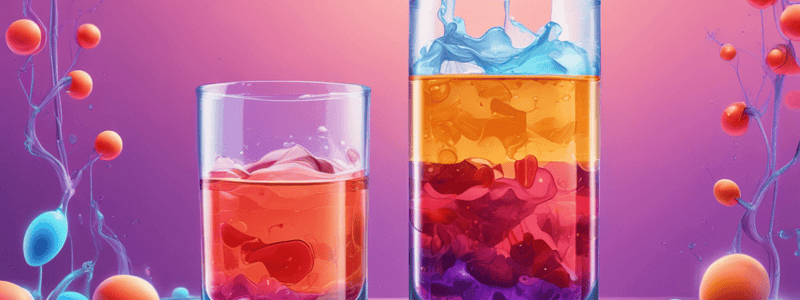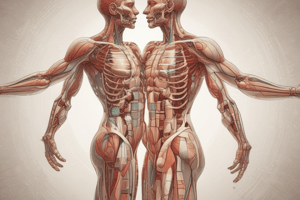Podcast
Questions and Answers
What is the role of calcium in the body?
What is the role of calcium in the body?
- Aids in ATP formation (correct)
- Promotes dehydration
- Causes overhydration
- Induces acidosis
Which condition can be indicated by bicarbonate levels?
Which condition can be indicated by bicarbonate levels?
- Acidosis (correct)
- Overhydration
- Dehydration
- Alkalosis
How do cations differ from anions in electrolytes?
How do cations differ from anions in electrolytes?
- Anions have a neutral charge
- Cations have a positive charge (correct)
- Cations have a negative charge
- Anions have a positive charge
What is the function of the sodium-potassium pump in the body?
What is the function of the sodium-potassium pump in the body?
How do solutions in biology typically consist of solvents and solutes?
How do solutions in biology typically consist of solvents and solutes?
What effect do colloid solutions have on edema?
What effect do colloid solutions have on edema?
Flashcards are hidden until you start studying
Study Notes
- Atoms carry charges in organic and carbon molecules, which are stabilized by water to perform metabolic functions.
- Cations have a positive charge, while anions have a negative charge in electrolytes.
- The sodium-potassium pump is assisted by insulin and epinephrine, crucial for maintaining potassium levels.
- Calcium is essential for bone growth, heart muscle function, nerve signaling, and blood clotting.
- Bicarbonate levels indicate acidosis or alkalosis conditions in the body, while phosphorus is crucial for ATP formation.
- Solutions consist of solvents (fluid) and solutes (dissolved particles), with fluid and electrolyte movement crucial for cell balance.
- Active transport mechanisms like the sodium-potassium pump and osmosis help in maintaining cellular balance.
- Fluid compartments in the body account for 60% of total body weight, with intracellular and interstitial fluids playing vital roles.
- Feedback systems regulate fluid balance within the body to maintain homeostasis.
- Dehydration and overhydration are results of fluid volume imbalances in the body, with distinct signs and symptoms.
- IV fluids mimic body compounds and ions, with normal saline being a common choice based on sodium concentration.
- Different types of IV solutions (crystalloid, colloid) have varying tonicity levels and effects on fluid compartments.
- Colloid solutions help reduce edema by drawing fluid into the vascular compartments but require careful monitoring to prevent fluid overload.
- Isotonic, hypotonic, and hypertonic solutions have different effects on fluid compartments and are used based on patient needs and conditions.
Studying That Suits You
Use AI to generate personalized quizzes and flashcards to suit your learning preferences.




